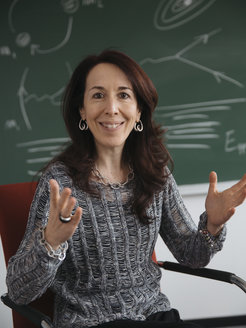Alessandra Buonanno elected member of the US National Academy of Sciences
Membership is a widely accepted mark of excellence in science and is considered one of the highest honors that a scientist can receive
Professor Alessandra Buonanno, director at the Max Planck Institute for Gravitational Physics (Albert Einstein Institute) in Potsdam has been elected member of the US National Academy of Sciences (NAS). Currently, a maximum of 120 members across all sciences may be elected annually to the academy. Members are elected in recognition of their “distinguished and continuing achievements in original research”. Buonanno will be officially inducted into the NAS at its next annual meeting in the spring of next year.
“I feel deeply honored to have been recognized by such distinguished scholars and I am truly delighted to join such important academy” says Alessandra Buonanno, head of the department “Astrophysical and Cosmological Relativity” at the Max Planck Institute for Gravitational Physics (Albert Einstein Institute) in Potsdam. “It is a fantastic reward not only for my own research in gravitational-wave physics, but for the excellent work that the members of my research groups at the AEI and at the University of Maryland have done over several years.”

Alessandra Buonanno studied theoretical physics in Pisa, and held faculty positions in Paris and at the University of Maryland, where she became full professor in 2010. She is a leading theorist in the field of gravitational-wave physics, and a Principal Investigator of the LIGO Scientific Collaboration. Her work on waveform modeling has been essential in the detection of gravitational waves from binary systems composed of black holes and/or neutron stars, and the physical interpretation of the signals. For her contributions to LIGO and Virgo discoveries, she was awarded several prizes, including the 2018 Gottfried Wilhelm Leibniz prize – the most prestigious research prize in Germany – and the 2021 Galileo Galilei Medal. She recently has been elected member of the German National Academy of Sciences Leopoldina. Buonanno is a Fellow of the International Society on General Relativity and Gravitation, and of the American Physical Society. She holds a research professorship at the University of Maryland, and honorary professorships at the Humboldt University in Berlin, and at the University of Potsdam.
The US National Academy of Sciences (NAS) is a private, non-profit society of distinguished scholars. Established by an Act of Congress, signed by President Abraham Lincoln in 1863, the NAS is charged with providing independent, objective advice to the nation on matters related to science and technology. Scientists are elected by their peers to membership in the NAS for outstanding contributions to research. The NAS is committed to furthering science in America, and its members are active contributors to the international scientific community. Nearly 500 current and deceased members of the NAS have won Nobel Prizes, and the Proceedings of the National Academy of Sciences, founded in 1914, is today one of the premier international journals publishing the results of original research.












